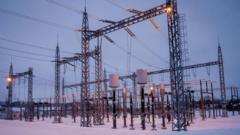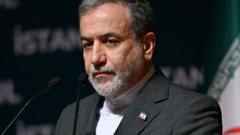The Baltic states of Estonia, Latvia, and Lithuania made a historic transition from the Russian-controlled Brell power grid to the European Union's electricity network, marking a significant milestone in European energy security and regional independence. This move, initiated in response to geopolitical tensions exacerbated by Russia's invasion of Ukraine, demonstrates both defiance against past vulnerabilities and a collective stride toward a more secure energy future.
Baltic States Complete Energy Transition from Russia to EU Grid

Baltic States Complete Energy Transition from Russia to EU Grid
Estonia, Latvia, and Lithuania have successfully disconnected from Russia's electricity network, securing their energy independence and joining the European Union's grid.
In a ceremony in Lithuania, European Commission President Ursula von der Leyen proclaimed the day as a historic moment for freedom from Russian influence. Polish President Andrzej Duda described the action as a vital step towards security and resilience in the region.
The Baltic states' transition has been a long-planned endeavor that showcases their alignment with EU objectives and their commitment to energy independence. Since 2022, these countries have refrained from purchasing electricity from Russia, but remained tethered to the Brell grid, which posed risks of reliance on Moscow for energy needs.
Amidst security concerns following multiple incidents of undersea cable damages attributed to a so-called "shadow fleet" from Russia, von der Leyen emphasized the need for vigilance. The region has experienced at least 11 instances of cable damages in the past year and a half. Lithuanian President Gitanas Nauseda called for sanctions on Russia's maritime activities, underscoring the seriousness of the threats faced.
Significant investment amounting to approximately 1.6 billion euros facilitated this crucial energy shift, predominantly funded by the EU, epitomizing the bloc's support for these nations. The carefully orchestrated transition involved a brief period as an "energy island" before fully integrating into the EU grid.
Ukrainian Energy Minister German Galushchenko welcomed the switch as a meaningful event for Europe, reinforcing the sentiment of solidarity among nations in the face of geopolitical challenges.
As this pivotal transition concludes, it not only showcases the Baltic states' resolve but also emphasizes the EU's commitment to enhancing energy security while navigating regional threats.
Through collaborative efforts and unity, the Baltic nations endeavor to forge a secure energy landscape that aligns with broader European ambitions.
The Baltic states' transition has been a long-planned endeavor that showcases their alignment with EU objectives and their commitment to energy independence. Since 2022, these countries have refrained from purchasing electricity from Russia, but remained tethered to the Brell grid, which posed risks of reliance on Moscow for energy needs.
Amidst security concerns following multiple incidents of undersea cable damages attributed to a so-called "shadow fleet" from Russia, von der Leyen emphasized the need for vigilance. The region has experienced at least 11 instances of cable damages in the past year and a half. Lithuanian President Gitanas Nauseda called for sanctions on Russia's maritime activities, underscoring the seriousness of the threats faced.
Significant investment amounting to approximately 1.6 billion euros facilitated this crucial energy shift, predominantly funded by the EU, epitomizing the bloc's support for these nations. The carefully orchestrated transition involved a brief period as an "energy island" before fully integrating into the EU grid.
Ukrainian Energy Minister German Galushchenko welcomed the switch as a meaningful event for Europe, reinforcing the sentiment of solidarity among nations in the face of geopolitical challenges.
As this pivotal transition concludes, it not only showcases the Baltic states' resolve but also emphasizes the EU's commitment to enhancing energy security while navigating regional threats.
Through collaborative efforts and unity, the Baltic nations endeavor to forge a secure energy landscape that aligns with broader European ambitions.



















